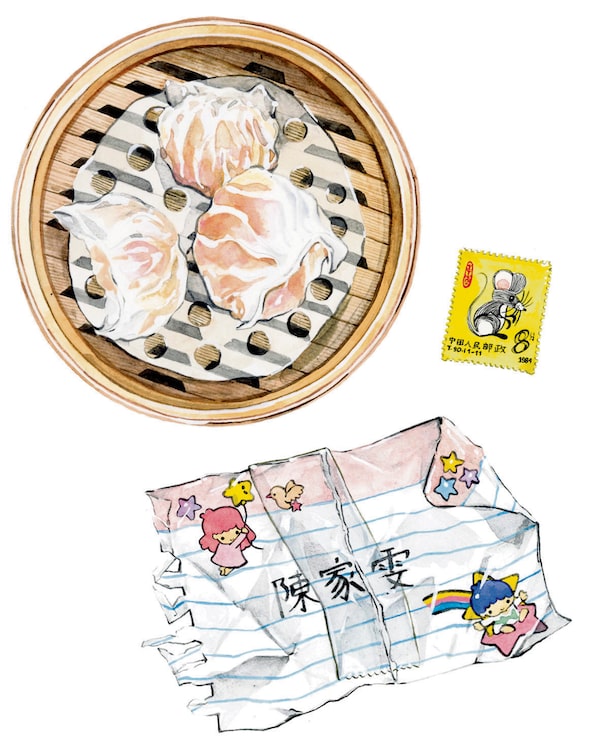First Person is a daily personal piece submitted by readers. Have a story to tell? See our guidelines at tgam.ca/essayguide.

Illustration by Janice Wu
I had a little cry when I realized that no one would ever call me by my Cantonese name ever again. An identity already so fragile was fractured further into extinction. The phonetic translation, Carmen, was both my middle name and a gesture of accommodation my parents decided upon because “Claudia,” plucked from a 1980s baby book, would be too difficult for my grandmother to enunciate. Claudia would be the white-interfacing identity they prescribed for me. Carmen was intimate – reserved for her and me.
My paternal grandmother or Mah Mah died earlier this January at the end of the Year of the Rat, a zodiac marked by calamity every 60 years in Chinese history from the Boxer Rebellion, the First Opium War, the Great Famine and now a global pandemic. Her departure was the unexpected finale to a year of cyclically unfolding devastations.
In the spirit of recreating the ritualistic address I had with my Mah Mah, I present myself as Carmen to new English-language speakers so as to extend the same gentle accommodation; to make myself accessible and reduce the barriers in our exchange.
A former French-Canadian best friend once expressed her welcome for newcomers but simultaneous scorn at those who made little effort to integrate; to properly learn the language(s) and customs of their host country. I seemed to meet her criteria of the “well assimilated” since I manoeuvred naturally between English and French. However, in my rootlessness, born in Vancouver with no home territory to claim, I aspired impossibly to be just as native as she. In my desperation, I wanted something to cling onto – a place, an ideal, an object to long for.
For half my lifetime, I sat ambivalently across from my Mah Mah over webbed chicken feet, Peking duck and shrimp dumplings, estranged in both time and place from this Toisanese village woman who would make the West Coast home for four decades but could barely utter more than a few English words. I absorbed the intolerant attitudes of my peers by osmosis; replicating this othering by their example toward my grandmother. She became more and more alien and so to distance myself from the disgraced stereotype of “foreigner,” I became less and less accommodating.
Although I was a poor practitioner of this idea myself, I first investigated the concept of “reasonable accommodation” in university. It speaks to the allowances or adjustments made for different religious, cultural and other minority groups so that they could integrate with more ease into society. In Canada, it was explored in detail by the Bouchard-Taylor Commission in 2007, which continues to provide a political framework for reconciliatory efforts when dealing with intercultural relations as they become ever more nuanced in their complexity.
Issues like this are widely stated and accepted but have been hard-won and continue to be politically contested in some instances, such as allowing the visually impaired to enter indoor public spaces with a guide dog or granting the same salary and position to a woman when she returns from maternity leave. More delicate examples would include allowing students to wear religious symbols to class, such as a turban, hijab or kirpan, or prohibiting male partners from attending Lamaze classes to respect the religious beliefs of female Muslim attendees.
The Chinese have been so absent from this conversation that, as I looked at the kinds of accommodations made in the last 40 years of Canadian history, I didn’t even recognize myself as someone requiring any. Over time, I’ve come to identify myself as ESL-adjacent. Language is always borrowed and is never mine. I grew up with Cantonese but I can hardly string a sentence together. While English is my primary language – because that’s what is required of me – it will always seem short of liquid perfection as I grew up surrounded by a family who would confuse words, mix tenses and speak in blunted sentences. The fluency expected of me confines my ability to freely express myself; I would second guess, stutter, stumble, mince my words and their rhythm.
Like many, I am susceptible to preconceived notions of the Chinese accent, its “unattractiveness.” This past spring, while kayaking with my dad in Deep Cove in North Vancouver, he exclaimed mid-paddle: “The wind is comfy!” I wrinkled my nose, vexed by the irregular syntax drawn out in an arrhythmic cadence. I then paused. I withdrew momentarily from my anglicized mind as I tried to decipher exactly what he was saying. Deep in the recesses that clutched onto this lost language, it clicked. He had attempted a literal translation. In Cantonese, “comfortable” can be synonymous to “soothing.” He shortened it to “comfy” to sound colloquial.
The ancient character for wind, or feng in Chinese, is depicted as a snake or a worm, as it borrows from the notion that insects are born from the wind as the seasons change. Where traditional medicine is essential to everyday conversation and language, wind is known as yang energy causing affliction upon the body. Wind can be invasive – its force and movement can cause turbulence, sweeping you abruptly to places unknown. It is through the bluster of this current that we are impelled to let go of the beliefs that no longer serve us.
I inhaled the realization of my dad’s expression and exhaled with the stroke of the wind. I let go of trying to correct his disjointed English and his accent; I let go of casting unto him, the nomenclature of “bad immigrant.” I let go of us being othered and somewhere perpetually lost in translation between neither Cantonese nor English, we find our way to one another.
Claudia Carmen Chan lives in Vancouver.
Sign up for the weekly Parenting & Relationships newsletter for news and advice to help you be a better parent, partner, friend, family member or colleague.